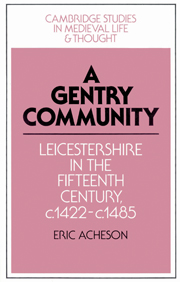Book contents
- Frontmatter
- Contents
- List of maps
- Acknowledgements
- Abbreviations
- Introduction
- 1 Leicestershire: the county, the Church, the crown and the nobility
- 2 The gentry in the fifteenth century
- 3 Land and income
- 4 A county community and the politics of the shire
- 5 The gentry and local government, 1422–1485
- 6 Household, family and marriage
- 7 Life and death
- Conclusion
- Appendices
- Bibliography
- Index
- Titles in the series
- Frontmatter
- Contents
- List of maps
- Acknowledgements
- Abbreviations
- Introduction
- 1 Leicestershire: the county, the Church, the crown and the nobility
- 2 The gentry in the fifteenth century
- 3 Land and income
- 4 A county community and the politics of the shire
- 5 The gentry and local government, 1422–1485
- 6 Household, family and marriage
- 7 Life and death
- Conclusion
- Appendices
- Bibliography
- Index
- Titles in the series
Summary
The heated and often vitriolic debate, the ‘Storm over the Gentry’, which attempted to explain the origins of the English Civil War, produced much sound and fury. Like any storm, it eventually abated, leaving in its wake, if not tattered reputations, certainly bruised egos and, no doubt, the belated recognition by some British historians that the age of chivalry is indeed dead. But it would be unfair to suggest that the sound and fury signified nothing beyond the obvious or that, after all, the debate had been little more than a storm in a tea-cup. On the positive side, the controversy soon revealed that theory had overrun the available evidence and that more research was required. A new generation of historians readily accepted the implied challenge, producing county and regional studies which shed light on, as opposed to generating heat about, the economic and political concerns of the sixteenth- and seventeenth-century gentry.
Interest in the English gentry, however, has not been confined to historians of the sixteenth and seventeenth centuries. K. B. McFarlane, in his 1945 lecture on bastard feudalism, proposed that late medieval society would ‘only yield its secrets to the investigator who can base his conclusions upon the study of hundreds of fragmentary biographies’. A year earlier, McFarlane had attempted to counteract notions of the knights of the shire in parliament as the political pawns of the lords.
- Type
- Chapter
- Information
- A Gentry CommunityLeicestershire in the Fifteenth Century, c.1422–c.1485, pp. 1 - 6Publisher: Cambridge University PressPrint publication year: 1992



